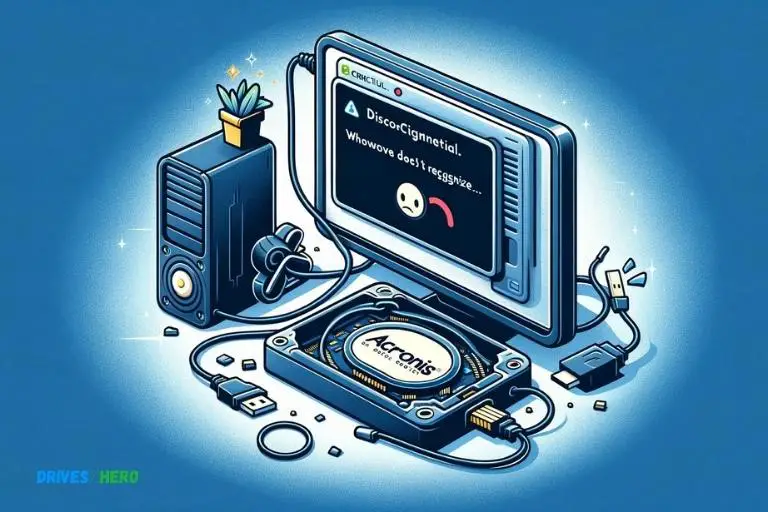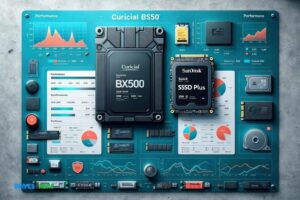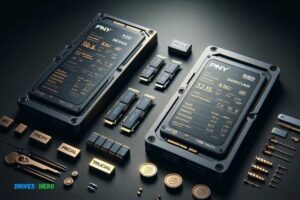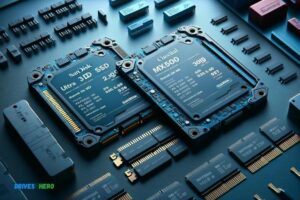Acronis Does Not Recognize Crucial Ssd: A Simple Guide!
When encountering the issue of Acronis not recognizing a Crucial SSD, several factors may contribute to this problem.
Firstly, ensuring that the SSD is properly connected and recognized by the system’s BIOS is crucial. Compatibility issues between Acronis software and specific Crucial SSD models may arise, requiring users to check for updates or patches that address such concerns.
Confirming that the SSD has the latest firmware update is essential, as outdated firmware can lead to recognition issues.
Users should also check for any conflicting software or drivers that might interfere with Acronis detection.
If the problem persists, reaching out to both Acronis and Crucial support for assistance and exploring community forums for similar experiences and solutions can be beneficial in resolving the recognition issue.

Key Takeaway
Possible Causes Of The Issue
Possible causes of Acronis not recognizing Crucial SSD could include outdated Acronis software, incompatible SSD firmware, incorrect SSD connection, or driver issues.
Make sure to update Acronis software, check SSD compatibility, ensure proper connections, and update drivers to troubleshoot the issue.
- Incompatibility between Acronis software and Crucial SSD: Acronis software may not be fully compatible with Crucial SSDs, leading to recognition issues. This can occur due to differences in hardware specifications or firmware settings.
- Outdated or incompatible Acronis software version: If you are using an outdated version of Acronis software, it may not support the newer models of Crucial SSDs. Make sure to check for software updates and install the latest version to ensure compatibility.
- Incorrect SSD firmware or drivers: Outdated or incompatible firmware and drivers for the Crucial SSD can also cause recognition issues with Acronis software. It is crucial to keep your SSD firmware up to date and ensure the correct drivers are installed.
- Hardware connection issues: Sometimes, the problem lies in the hardware connections. Ensure that the Crucial SSD is properly connected to the system, both physically and in terms of the data cables. Faulty or loose connections can prevent Acronis from recognizing the SSD.
Remember to troubleshoot each of these possible causes carefully to identify and resolve the issue you are experiencing with Acronis recognizing your Crucial SSD.
Troubleshooting Steps
Follow these troubleshooting steps to resolve the issue and ensure smooth functionality of your system.
Verify Ssd Compatibility With Acronis Software
- Before troubleshooting further, it is essential to check if your Crucial SSD is compatible with the Acronis software you are using.
- Not all SSDs work seamlessly with every backup and recovery software. Refer to the Acronis compatibility list to ensure that your SSD model is supported.
Check For Acronis Software Updates
- Outdated software can sometimes cause compatibility issues. Check for any available updates for the Acronis software you are using.
- Updating the software to its latest version can help address compatibility problems and improve overall functionality.
Update Ssd Firmware And Drivers
- Keeping your SSD firmware and drivers up to date is crucial for optimal performance and compatibility with software applications.
- Visit the official Crucial website and download the latest firmware and drivers for your specific SSD model. Follow the instructions provided by Crucial to update the firmware and drivers on your SSD.
Verify Proper Hardware Connections
- Sometimes, Acronis may not recognize your Crucial SSD due to loose or faulty hardware connections. Ensure that the SSD is connected properly to the motherboard and power supply.
- Check the SATA cables and ports for any signs of damage or loose connections. Reconnect the SSD if necessary, making sure it is securely seated in the appropriate slot.
Restart The Computer
- A simple restart can often resolve minor software or hardware glitches that may be preventing Acronis from recognizing your Crucial SSD.
- Restart your computer and launch Acronis software again to see if the issue persists.
- Sometimes, a fresh start can establish the necessary connections and allow the software to detect your SSD successfully.
By following these troubleshooting steps, you should be able to resolve the issue of Acronis not recognizing your Crucial SSD.
Remember to ensure SSD compatibility, check for software updates, update SSD firmware and drivers, verify hardware connections, and restart your computer.
Alternative Backup Solutions
Acronis backup software fails to recognize Crucial SSD, prompting the need for alternative backup solutions. Ensure your data is safely backed up and protected by exploring other reliable options in the market.
Acronis Does Not Recognize Crucial Ssd
Many users have reported similar problems, but fret not, as there are alternative backup solutions available. Each of these solutions offers its own unique set of features and advantages.
Windows Backup And Restore:
- Windows Backup and Restore is a built-in backup utility that comes with Windows operating systems.
- It offers a straightforward and user-friendly interface, making it easy to perform backups and restores.
- With Windows Backup and Restore, you can create system images, backup files, and even schedule automatic backups to ensure your data is always secure.
- This solution is particularly beneficial for Windows users who prefer a familiar and integrated backup tool.
Macrium Reflect:
- Macrium Reflect is a robust backup and disk imaging software that provides advanced features for data protection.
- It offers a wide range of backup options, including full, incremental, and differential backups, allowing you to choose the most suitable method for your needs.
- With Macrium Reflect, you can easily create and restore system images, clone disks, and even migrate your operating system to another drive.
- This solution is highly regarded for its speed, reliability, and flexibility, making it a popular choice among users seeking a comprehensive backup solution.
Aomei Backupper:
- AOMEI Backupper is another powerful backup tool that offers comprehensive backup and restore capabilities.
- It supports a wide range of storage devices, including SSDs, HDDs, and external drives, making it versatile for different backup scenarios.
- Additionally, AOMEI Backupper allows you to create disk or system backups, perform file backups, and even sync files in real-time.
- This solution’s intuitive interface and easy-to-use features make it suitable for both beginners and advanced users alike.
If you’re facing issues with Acronis not recognizing your Crucial SSD, there are alternative backup solutions available.
Windows Backup and Restore, Macrium Reflect, and AOMEI Backupper offer different features and functionalities to suit your backup needs.
Choose the one that best aligns with your requirements and enjoy the peace of mind that comes with knowing your crucial data is securely backed up.
Conclusion
It’s clear from the above discussion that Acronis does not recognize Crucial SSD drives. This can be a frustrating situation for users who are relying on Acronis for their data backup and recovery needs.
Unfortunately, the lack of recognition means that these crucial drives may not be accessible or included in the backup process.
While Acronis may support a wide range of drives, it is important to note that compatibility issues can arise. It is advisable to explore alternative backup solutions that are known to be compatible with Crucial SSD drives.
This will ensure that your data is safeguarded and that you can restore it without any hassles. Remember to do thorough research and read user reviews before settling on a backup solution to avoid any further incompatibility issues.






